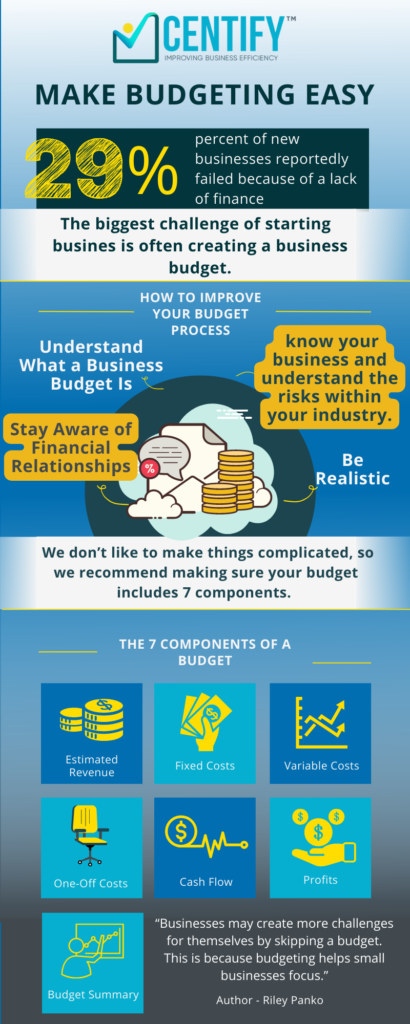Starting a small business has many challenges. However, the biggest challenge is often creating a business budget. People don’t use a budget in their personal life and everything works out (most of the time). So, when a few of those people start a business, they think they can simply wing it financially and everything will be fine. That is one of the worst financial strategies a business owner can use.
Today, we are going to share exactly what a business budget is and focus on why you need one. We’ll also look at a budget. Finally, we will discuss other financial strategies your business should follow.
What is a Business Budget?
A business budget is how you will use every dollar to implement your business plan. You will use this money to reach your short-term goals, long-term goals, and any other goals in between.
A Better Business Budgeting Process
Now that you know what a business budget is, you must be aware of why you need a better business budgeting process. Understanding this will allow you to stay on course while creating your business budget and even revising it as needed.
The main reason you need a better business budgeting process is planning. During your business budgeting process, you will find yourself creating a detailed financial plan for your business. This will include establishing numerous financial objectives and how you will accomplish each one.
Doing this will allow you to articulate your vision, strategy, and goals. It will also provide deadlines for reaching each financial objective and creates discipline.
How to Improve Your Business Budgeting Process
There are a few key things you should keep in mind when you are working on your business budgeting process. These things will ensure you create an excellent business budget that will be effective.
- Understand What a Business Budget Is
Okay, well, you should know this already, since we just covered it. So, you can essentially check this one off your list!
- Know Your Business
It is vitally important to know your business and understand the risks within your industry. This is also the time to determine if you will have more seasonal sales, which could result in a greater financial impact. That impact would obviously be good when sales are booming and negative when sales go down.
However, understanding all this can help you create a workable business budget.
- Create the Best Budgeting Team
As a small business owner, your budgeting team may only include you. Or you may partner with us at Centify, or another person, to help you create a business budget. Don’t be afraid to ask for help if budgeting is not your area of expertise.
- Be Realistic
You may want your business to earn millions of dollars in the first six months, but that number isn’t going to be realistic when creating your budget. Instead, focus on future projections. And if your business has been open for a while, you can also use past results for your budget.
- Be Conservative
Since you are being realistic with your budget, we recommend you be slightly conservative too. Unexpected costs occur all the time. You should prepare for them within your budget by either rounding up line items or having an actual contingency budget.
- Be Flexible
Being flexible is the name of the game as a business owner. You may think you have created the perfect business budget. Then three months down the road, everything goes haywire and you will be back at the drawing board making revisions.
It is best to be okay with this and accept that budgets are supposed to be amended regularly.
- Use Specific Details
You don’t want to go crazy and have a line item for every single expense your business will have in your budget. Yet you can add details to each category, so you know what is included within those expenses.
This will keep you from wondering whether a new printer is a supply expense or an office expense. Hey, we’ve seen stuff like that happen more times than we can count!
- Stay Aware of Financial Relationships
Changing a single line item in your budget may seem possible until you realize that one small change triggers changes in other lines too. Please keep this in mind or you will find yourself working with a budget that is no longer balanced.
A prime example of this is increasing your sales by 20% and then forgetting to budget in the costs related to that boost in sales.

How to Create a Business Budget
There are numerous ways to create a business budget. We don’t like to make things more complicated than they are, so we basically recommend making sure your budget includes 7 components.
- Estimated Revenue
The estimated revenue for your business is all the money you plan on making from sales of either goods or services during the year. No expenses, or anything else, is subtracted from this amount before it is placed on the estimated revenue line.
- Fixed Costs
Every business has fixed costs they need to pay every month, quarter, or year. A few fixed costs in your business may include rent, utilities, insurance, bank fees, and legal services.
- Variable Costs
Just like fixed costs, variable costs are a part of doing business. Your variable costs line may include production costs, material costs, or packaging costs (any cost that ‘varies’ with the amount of your output). Credit card fees are another variable cost that many businesses overlook.
- One-Off Costs
Moving to a new office space, new software, or a new desk are all types of one-off costs for businesses. These normally receive their own line item, because they are items that are not needed to be paid for regularly.
- Cash Flow
Your business’s cash flow is one of the most important items in your budget. The goal is to always have a positive cash flow. If you notice that you don’t have more money coming into your business than going out, it is time to rework your business budget.
- Profits
To obtain your profits, you simply subtract all your expenses from your revenue (don’t forget about the taxes!). Again, the goal here is to have a positive number. If you have a negative number after creating your budget, you will need to rethink your expenses and even consider raising your prices.
- Budget Summary
Once your budget is created, we recommend creating a budget summary. This one-page document will have each of your budget categories, as well as the amount you have budgeted for each. This will allow you to see the numbers in one easy-to-read spot without becoming overwhelmed with a bunch of numbers.
Including these seven components in your budget will allow you to understand where the money is going within your business.
Financial Strategies Every Business Can Benefit From
You may think you are all set, once you have your business budget in place. However, there are a couple of other financial strategies you can use within your business to ensure financial success.
Separate Your Business and Personal Expenses
One of your biggest headaches while running a business will happen if you don’t separate your business and personal expenses. Paying for business expenses with your personal credit card may seem to be a good idea. But trying to claim those expenses on your business taxes can become tricky. So can recoup that money from your business accounts.
If you don’t want an accounting nightmare, keep these expenses separate. It’s a lot easier when it comes to tax time.
Keep Track of Business Cash Flow
Keeping track of your business’s cash flow is a must. This should be done weekly, so you don’t forget what each transaction was for. Knowing how much money is going in and out of the business all the time is also helpful because it will prevent you from overspending.
Failure to keep an eye on your cash flow may result in you spending more than you should for expenses in your business. This is why it is such an important line item on your business budget!
Are you ready to start creating a budget for your business? Or do you need help making your business budget work? Contact us to set up an appointment to see if we can help you with your business’s needs.









